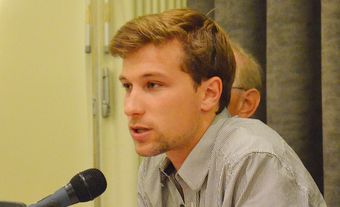Manon Massé is a politician, feminist activist, active community partner and social worker (born May 22, 1963 in Windsor, Quebec). She co-founded the political movements Option citoyenne and Québec solidaire. She has been a member of the Quebec National Assembly (Assemblée nationale du Québec) for the riding of Sainte-Marie-Saint-Jacques since April 2014. In May 2017, she became co-spokesperson for Québec solidaire with Gabriel Nadeau-Dubois.

Roots
Manon Massé was born in the Estrie region into a devout Catholic family from Windsor and defines herself as working-class through and through. Throughout her childhood, she was surrounded by a working-class environment. Her father, uncle and almost the entire town worked at the Domtar paper mill. Her mother also had an industrial job in a paper bag factory.
At the age of 7, she and her family moved from the Estrie region to the Montreal suburb of Boucherville. Nevertheless, Massé retained a sense of belonging and pride in the region where she was born: "Windsor is my home. A good part of my parents’ families still live there.”
In high school, she was drawn to pastoral activities. At the time, the school's pastoral education service brought students together to discuss various social issues through the lens of the Catholic faith. She discovered a world far removed from her parents' religious practices, guilt and Christian morality. She appreciated this new humanist approach to faith, where the name Jesus wasn’t even mentioned.
The practice of social pastoral work enabled her to explore the relationship between self and other. In fact, it was the philosophical side of faith appealed to her. In her book Parler vrai, published in 2018, she recalls that at the time, the Quebec clergy was part of a powerful progressive movement. According to her, they were influenced by the principles of liberation theology. So there was a space to take a closer look at the power dynamics that characterize society, based on the teachings of the Gospels.
Applied policy
It was at Cégep Édouard-Montpetit that Manon Massé developed her organizational skills. The retreats and other camps organized by the social pastoral ministry were opportunities to confirm her vocation. Organizing these retreats allowed her to get in touch with facilitating and developing content for her workshops, among other things. The social aspect of these stays motivated her.
In 1983, Massé enrolled at the Université de Montréal, where she completed a major in theology. It was while studying this extract from the Gospel according to Matthew that she realized the direction she wished to give to her desire for devotion:
For I was hungry and you gave me something to eat, I was thirsty and you gave me something to drink, I was a stranger and you invited me in, I needed clothes and you clothed me, I was sick and you looked after me, I was in prison and you came to visit me. […] Whatever you did for one of the least of these brothers and sisters of mine, you did for me.
She realized that her path was not in theology, but rather in the world of the marginalized, those who constantly suffer social injustice. Serving this population, she became involved as a community organizer with the Comité social Centre-Sud serving this marginalized population, in 1986 as her first professional job.
At the time, the consequences of the 1981 economic crisis were still being felt and low-wage earners were the hardest hit. Since many factories in Montreal's east end had closed their doors, the entire job market was transformed. In her book Parler vrai, Massé states, "In an environment like this, helping each other is not a choice, it's a necessity."
On the move
On March 17, 1994, Manon Massé met Françoise David, newly elected president of the Fédération des femmes du Québec, for the first time. At the time, David was preparing a major march to fight poverty. It was on this day that the first meeting to organize the event was held. Massé was invited to take part by her partner at the time, a colleague of David. On the basis of her previous involvement, she was appointed as coordinator of the logistics working group on a voluntary basis.
The large-scale event named Du pain et des roses was a tribute to the 1912 textile workers' strike in Lawrence, Massachusetts. Nine demands were on the agenda including raising the minimum wage, developing pay equity legislation and automatic collection of child support payments.
For 10 days, from May 26 to June 4 1995, rain or shine, hundreds of walkers converged on Quebec City.
Following this event, Massé says she understood what would drive her social and political involvement from now on. She realized that feminism is synonymous with humanism. Later, she wrote that: "To understand poverty, racism, exclusion and homophobia, we cannot do without feminist analysis [...]". (See also Intersectionality.)
Political career
After co-founding the non-partisan collective D'abord solidaires in 2002, Manon Massé took part in the emergence of the political movement Option citoyenne in 2003. The activists’ goal was to move from words to actions by prioritizing issues related to feminism, ecology, poverty and globalization. In May 2004, the manifesto Bien commun recherché : Une option citoyenne was published. This manifesto, signed by Françoise David, set the scene for a rallying of progressive forces on the left. The values enshrined in this manifesto took the form of a new political party founded on February 4, 2006: Québec solidaire is the result of a merger between Option citoyenne and the Union des forces progressistes.
In that same year, Massé became the very first Québec solidaire (QS) candidate in a by-election in the riding of Sainte-Marie-Saint-Jacques. She was elected in 2014, after five attempts. She became the third QS elected representative that entered Parliament, after Amir Khadir in 2008 and Françoise David in 2012. As co-spokesperson for QS with Gabriel Nadeau-Dubois since 2017, she was also the party's parliamentary leader until September 2021.
In May 2023, Massé announced that she would not seek a new term as Québec solidaire's women's co-spokesperson. She wants to prioritize her role as Member of Parliament for Sainte-Marie-Saint-Jacques. With this announcement, Massé is calling on the next generation of progressive women to step into her shoes. She believes the time is right to pass on the baton, since Québec solidaire has matured.

 Share on Facebook
Share on Facebook Share on X
Share on X Share by Email
Share by Email Share on Google Classroom
Share on Google Classroom

